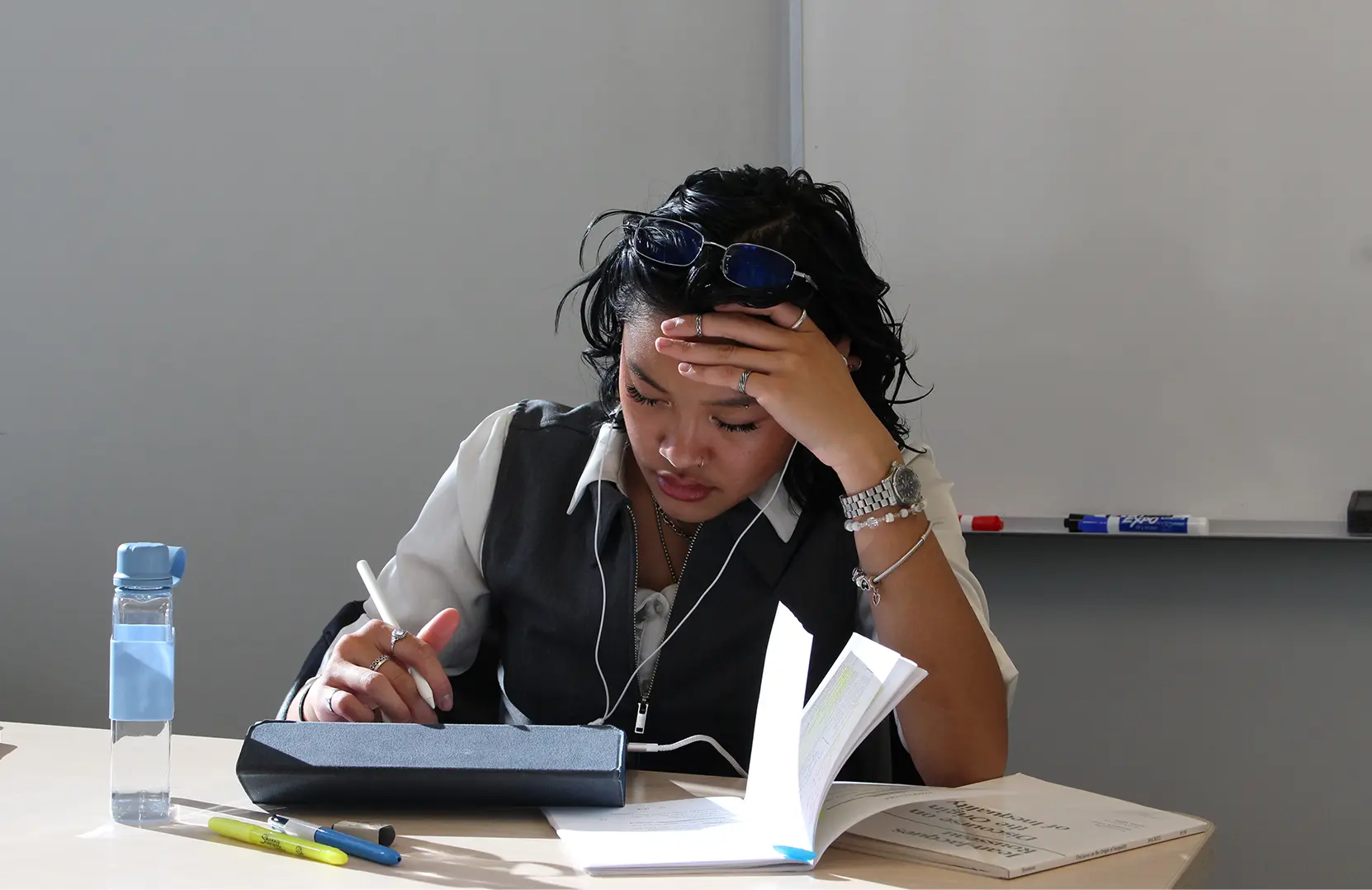Camille Villoso, MacEwan University student, appears stressed while studying, balancing notes and digital work during a challenging study session. Edmonton, AB. October 16, 2025. Alexia Pang/The Griff
Where is the line between just “busy” and “overwhelmed”?
The school year churns on, and that means stress, anxiety, grinding, and locking in.
Is it just me, or are our professors intentionally choosing due dates that make our lives harder? Is the study workload increasing each year, or is it just my perception? Is this the same at every university, or is it just at MacEwan? To find out, I have talked to some MacEwan students and exchange students.
Here at MacEwan, nine credits (or three courses) per term is enough to be considered a full-time student. But what exactly do credits quantify? According to the MacEwan Classification of Registered Students, a credit is the unit of measure for the completion of Credit Courses, which are typically based on the number of classroom hours per week. A three-credit course has three classroom hours per week during the term. But, it doesn’t say how much time you should spend outside of class to prepare and study at home.
“I would describe it as a lot of work. I have several courses per week, several deadlines, a lot of midterms. So I’m really stressed at the moment.”
– Sarah, exchange student majoring in international business.
In Europe, universities use the European Credit Transfer and Accumulation System (ECTS). It is used to facilitate the transfer of students between countries and make studies and courses more transparent. The student workload of a full-time study programme in Europe typically amounts to 36 to 40 weeks per year, or 60 ECTS per year, averaging one credit and ranging from 25 to 30 hours of work per week. This includes the study workload, encompassing both in-class and at-home studying.
Sarah, an exchange student from Germany majoring in international business, said, “I would describe it as a lot of work. I have several courses per week, several deadlines, a lot of midterms. So I’m really stressed at the moment.”
The main difference in study workload she experiences is that at her home university in Germany, they typically have only a final exam that counts for 100% at the end of each semester. In contrast, here at MacEwan, she has multiple deadlines and quizzes per week, which makes her feel more stressed.
“Those big arrangements might seem daunting at first, but when you make those bite-sized pieces, it becomes a lot simpler.”
– Oskari Haapalainen, exchange student majoring in music.
On the contrary, Oskari Haapalainen, an exchange student from Finland majoring in music says, “Those big arrangements might seem daunting at first, but when you make those bite-sized pieces, it becomes a lot simpler.”
The projects are built up during the semester with smaller assignments each week. He says it would be stressful if he let the smaller study load pile up. For him, keeping up with the work helps prevent stress and feelings of being overwhelmed. However, he feels that the workload at MacEwan is less than it was back home.
“I think the classes that I do at home are more demanding [from] a skill point of view.” Haapalainen says that here the smaller, weekly assignments feel a bit different. He also says he experiences more pressure from his professors back home, while here he feels more like a visitor. In Finland, he has other responsibilities, such as a job, while here he doesn’t, making the workload less intense.
“I looked at my finals schedule. I have three finals on one day, which I think is not reasonable.”
– Leonora Martin, exchange student majoring in business.
Leonora Martin, an exchange student from Germany majoring in business, says, “I looked at my finals schedule. I have three finals on one day, which I think is not reasonable. But I haven’t decided yet if I’m gonna move one or not because I feel like here it’s doable.” Martin feels that many people here make it seem like it’s hard and that you have to be stressed, and in the end, she feels she didn’t really have to be so stressed. “Like, for the midterm, everybody was stressing. I looked left and right, and people were like taking an hour, really, and I was like hey guys, I’m done now.”
First-year sociology student, Ellen Lewell, said her tactic for having a lot of assignments is to just “white knuckle it through.” She also says that the amount of stress you might have depends on what you’re studying.
There is a vast difference in study workload between students and majors. The kind of assignments, deadlines and exam preparations also differ significantly between majors. Music majors are practicing and performing, communication majors are writing, STEM majors are conducting calculations and taking exams, and business majors are completing numerous projects. It also depends on what you are used to and what your baseline of stress perception is. So, the question of studying “being too” much is really a subjective question that doesn’t have one answer. For one person, it might feel overwhelming, while for others, it is fine.





0 Comments